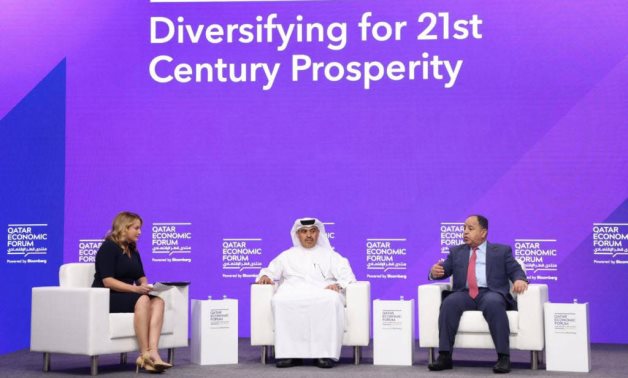
Minister of Finance, Mohamed Maait, during his participation in Qatar Economic Forum - Press photo
CAIRO - 21 June 2022: Egypt is looking forward to increasing Gulf investments, including Qatari ones, in the country, Minister of Finance Mohamed Maait stated.
Maait expressed his country’s aspiration to transform Gulf deposits in Egypt into real investments that take advantage of the promising development opportunities available in various fields, and the business-stimulating environment, which is based on a more developed legislative environment, and an infrastructure that is more qualified to accommodate further expansions in economic activities.
The minister pointed out his appreciation for the growing Gulf role in supporting Egypt during the current global economic crisis, which has exacerbated in the wake of the Coronavirus pandemic with the outbreak of war in Europe, which imposes on the Arab society, to complete the process of cooperation and integration; to achieve the desired integration in order to protect the Arab economies from exceptional global challenges.
During his participation in the Qatar Economic Forum, held under the slogan “Achieving equality in the global economic recovery equation,” the minister said, in the presence of a number of heads of state, leaders, official figures, and senior officials, that the Egyptian government is moving strongly towards empowering the private sector as an authentic partner in the development process. “ We look forward to a bigger role for the private sector during the next stage.”
"The plan is consistent with our belief that it is more capable of leading the job-rich economic growth process, in a way that meets the need to provide one million jobs annually,” he added.
He explained that an ambitious program has been prepared to attract "private investments" in a group of Egyptian state-owned assets in several promising sectors that have become more attractive to regional and international fund investments, as they provide stimulating opportunities in renewable energy projects, telecommunications, water desalination, and the real estate sector in new cities.
“Egypt targets $2.6 billion in investments in the pharmaceutical and medical supplies sector, $1.5 billion in construction, building and mineral inputs, $2 billion in agriculture and food, $2.5 billion in the textile sector, $4.1 billion in engineering, and 4 $3 billion in the chemical sector, in a manner that enhances the role of the private sector in maximizing production capacities to achieve self-sufficiency and food security, and increase the export power to attract hard currency,” he stated.
The minister noted that this comes especially in light of the severe turmoil in supply and supply chains, the rise in freight costs, the prices of goods and services, and the increase in financing costs as well, with the global trend to raise interest rates in an attempt to limit the effects of the unprecedented inflationary wave.
He explained that the government is opening the door to the green economy for the private sector and financial institutions in Egypt to take advantage of the growing green finance market, after it topped the Middle East and North Africa with the first offering of green bonds in September 2020 at a value of $750 million and $1.5 billion green loan, which won the “Green Bond Pioneer” and “Sustainable Finance for Best Sustainable Finance Deal” awards.
“We have an “ambitious green finance framework” that is consistent with market best practices, and enables us to issue green bonds or sukuk and green finance,” the minister stated.
Maait indicated that the “state ownership policy” document aims to increase the private sector’s participation in public investments from 30 percent to 65 percent in the next three years, while maintaining a growth of 7 percent or more for the Egyptian economy in the face of exceptional global challenges.
The government plans, within 3 years, to exit from 79 sectors, and reduce its investments in 45 other sectors, in a way that contributes to making room for the private sector, and attracting $40 billion in investments over the next four years, he pointed out.
The minister explained that the Egyptian economy has shown resilience in the face of global challenges, and absorbs internal and external shocks, starting with the emerging market crisis through the “Corona” pandemic, in a way that makes it more coherent in facing the negative effects of the war in Europe.
He referred to the gains resulted from the elaborate implementation of structural and economic reforms, which put Egypt among the few economies that recorded positive growth rates of 3.3 percent and 3.6 percent during the pandemic years, in addition to the decline in the unemployment rate to 7.2 percent in the second quarter of 2021, achieving a primary surplus instead of a primary deficit, and setting the debt rate on a downward path.
The minister said that the government is keen to achieve financial and economic goals despite all the successive global crises, pointing out that we achieved a tangible improvement during the second half of 2021, as the non-oil exports sector recorded its highest rate in years at 37 percent, while the tourism sector recorded revenues of about $6 billions.
“We aim to maintain a sustainable growth rate of at least 6 percent in the face of exceptional global challenges,” he added.
The minister explained that the economic recovery plan initiated by the state, in implementation of presidential directives, included allocating LE 130 billion to finance a social protection package to deal positively with the negative effects of the war in Europe, and mitigate the imported inflationary wave on the most vulnerable groups and sectors most affected, to provide the basic needs of citizens, secure a strategic reserve of food commodities, and arrange LE 36 billion to purchase 6 million tons of local wheat.
Comments
Leave a Comment